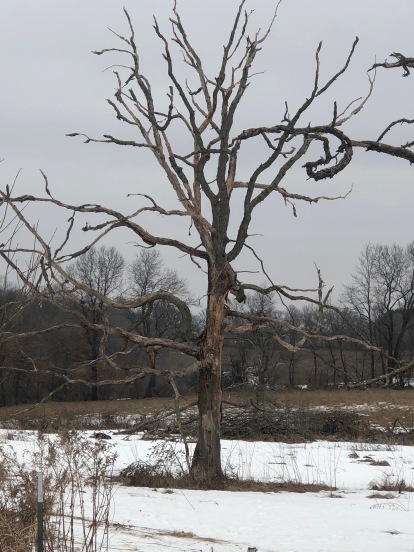Barbed Wire and Brush
It was Wednesday morning and I had the farm to myself. The day was gloomy, and my task was to cut the old barbed wire fences out of thorny brush. Shitty was the job, but I was happy for the space and solitude, and ready to get some serious work done. I loaded up the Gator with the bolt cutters, a bucket for hardware and scraps, my chainsaw, and a water bottle. Should be good to go for the morning.
I drove to the point in the fence where Danny and David had left off the previous day, and scratched my head. There had to be a way to do this that wouldn’t take all year. First, I grabbed the loose lines that they had cut from the t-posts, and worked on rolling them up in something of an orderly fashion. Yanking them from the grasses and tangleweeds in which they were ensnared, I’d roll a bit, then have a strand spring out to the side like a rogue slinky. I got two marginally clean rolls completed on the relatively open patch in the grasses. It worked okay.
The next section was composed of taller, thornier brush, and after struggling for awhile, I decided to change my strategy a bit; cutting slightly shorter, but still usable, segments. I’d duck in the head-high thorns, make a few cuts, and duck out. The low prickers stuck to my legs and lower back; the high ones scratched my face and pulled my hat off my head, and the middle ones wreaked havoc on my arms through my sweatshirt. I burst out with a string of expletives that would make a sailor shudder, and grabbed my chainsaw. Fuck it.

After relishing in a roaring and glorious clear-cutting of a section of bramble, I started to doubt the efficacy of that plan. Sawing around metal wires and t-posts seemed questionable for the extended life of my blade, and the brush would be so much easier to clear with our BCS mower after the wire and posts were removed. I decided to try Strategy 3. Ducking in at 3-4 foot increments, I cut each line in turn, threw the small segments of wire out into the field, and worked my way up another 3-4 feet. This way, the lines were hanging and exposed, there was no disentanglement of long strings of barbed wire through the thorny brush, no rolling was required, and the only cleanup was to bundle the strands and tie them together.
With this method, I finally found a flow – duck into a section; snip snip snip snip; duck into another section; snip snip…; backtrack and pick up the scraps; move ahead and duck into the next section; snip snip…; pick up, bundle, tie; repeat.
After a couple hours I looked up and realized I’d made some good headway. From the midst of the work, I reflected. The old fence became a metaphor for the land we’d inherited and the land we were building. Decrepit and lifeless was the sagging barbed wire – overcome with the thorns and brushes of years’ neglect – valuable only in its memory, and some salvageable t-posts. I imagined the new fence which would take its place in a matter of only weeks or months – woven wire, all-new wooden corner posts and straight, strong t-posts; circling the property functionally for the grazing ruminants of the future.
I thought about other messes we’d cleaned, in preparation for the better. The tangled thicket of stones and thorns beside our rock house, which was now a concrete pad encompassing our wash shed and walk-in cooler. The rock house itself; whose roof we’d lifted and floor we’d poured. The vegetable fields and hoophouses by the road, where before had only been neglected hay field.
I looked out upon the rugged pasture as I removed the old fence. Overgrown and rocky; housing only burdocks, old grasses and ghosts of perished oak trees. I wondered what had happened, or not happened, here in the past. I wondered how it would all look once our new fence and dogs were put to work in the rotation of animals and establishment of a healthy pasture. I thought about the land in 10 years. 20 years. 50.
I thought of another generation of farmers taking over as we aged ourselves out of the work. They would take over ownership and management, and take up their own initiatives. The farm would be theirs. The soul of the land and infrastructure, however, would always be ours in a way. We would always be able to look back upon these nasty jobs, and say with pride that we’d built it. It would be so beautiful.
I returned to the present, where the old tangled barbed wire meets the thorny brush. Sighing, I ducked my face and muscled into the mess. Snip. Snip. Snip. Snip…
